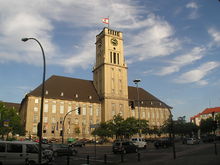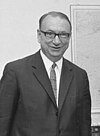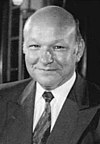Governing Mayor of Berlin
| Governing Mayor of Berlin | |
|---|---|
| Regierender Bürgermeister von Berlin (German) | |
 | |
since 27 April 2023 | |
| Type | Lord Mayor Head of government |
| Member of | Senate of Berlin |
| Residence | Rotes Rathaus |
| Appointer | Abgeordnetenhaus of Berlin |
| Term length | Pending resignation or the election of a successor |
| Constituting instrument | Constitution of Berlin |
| Precursor | Lord Mayor of Greater Berlin |
| Formation | 11 January 1951 |
| First holder | Ernst Reuter |
| Website | berlin |
The governing mayor (German: Regierender Bürgermeister) of Berlin is the head of government, presiding over the Berlin Senate. As Berlin is an independent city as well as one of the constituent states of Germany (Bundesländer), the office is the equivalent of the ministers president of the other German states, except the states of Hamburg and Bremen, where the heads of government are called "First Mayor" and "President of the Senate and Mayor", respectively. The title Governing Mayor of Berlin is the equivalent of Lord Mayor in the meaning of an actual executive leader.

According to the Berlin Constitution, the governing mayor is member and head of the Berlin Senate. The ministers are called senators. The two deputies additionally hold the title of Mayor (German: Bürgermeister, historically: burgomaster). The title Mayor is also held by the heads of the twelve boroughs of Berlin, although they do not actually preside over self-governmental municipalities.
The governing mayor is elected by the city's state parliament, the Abgeordnetenhaus of Berlin (equivalent to the Landtag of other federal states), which also controls their policy guidelines and is able to enforce resignation by a motion of no confidence. The governing mayor is entitled to appoint and release the senators of the government.
The seat of the Senate is the city hall, Rotes Rathaus, in Mitte.
History
[edit]As capital of the Kingdom of Prussia, Berlin received its first Lord Mayor (Oberbürgermeister) according to the Prussian reforms after the retreat of the Napoleonic occupation troops in 1809, approved by King Frederick William III. He served as head of the city council called Magistrat. The two-stage administration and the office of the boroughs' mayors were implemented in the course of the wide-ranging incorporations by the 1920 Greater Berlin Act.

During the Allied occupation after World War II, the city assembly (Stadtverordnetenversammlung) elected the Social Democratic politician Ernst Reuter as Lord Mayor on 24 June 1947, who, however, did not obtain the affirmation by the Allied Kommandatura of Berlin[1] due to Soviet reservations. Following the Communist putsch in Berlin's city government in September 1948, a separate city parliament (still named Stadtverordnetenversammlung von Groß-Berlin) was set up, however, de facto only competent for the western occupation sectors of what was to become West Berlin was elected on 5 December 1948, electing two days later a separate city government and Ernst Reuter Lord Mayor for West Berlin. The Soviet administration had officially deposed the previous elected government for all of Berlin with effect only in the eastern sector and had installed the SED Lord Mayor Friedrich Ebert, Jr. in East Berlin already on 30 November 1948.

West Berlin introduced its own constitution (Verfassung von Berlin), accounting for the changed facts, with effect of 1 October 1950. This constitution provided for the renaming of the city parliament to "Abgeordnetenhaus von Berlin", of the city government into "Senate of Berlin" and the head of government into "Governing Mayor of Berlin".[2] Following the new constitution representatives were elected on 3 December 1950 and the new parliament re-elected Ernst Reuter as head of city government on 18 January 1951, with Reuter then adopting the new title. From 1951 to 1990, during the Cold War, the governing mayor was the head of government in West Berlin with his seat at Rathaus Schöneberg, while East Berlin de jure remained under Soviet occupation and de facto became a part and capital of the East Germany — not recognized by the NATO members, but actually condoned by the 1971 Four Power Agreement on Berlin and the German Basic Treaty of 1972.
The government of West Berlin claimed to be the legitimate government for all of Berlin within the borders established by the 1920 Greater Berlin Act until the Peaceful Revolution of 1989. Even before German reunification on 3 October 1990, the West Berlin governing mayor and the East Berlin Oberbürgermeister held common cabinet meetings, until Berlin-wide elections took place on 2 December 1990.
List
[edit]
- Governing Mayor of Berlin (1951–present)
| No. | Portrait | Name (birth–death) |
Term of office | Political party | Election | ||
|---|---|---|---|---|---|---|---|
| Took office | Left office | Time in office | |||||
| West Berlin (1948–1990) | |||||||
| West Berlin was de facto part of the Federal Republic of Germany (West Germany) | |||||||
| 1 | 
|
Ernst Reuter (1889–1953) |
1 February 1951 | 29 September 1953 (died in office) |
2 years, 240 days | Social Democratic Party | 1950 |
| 2 | 
|
Walther Schreiber (1884–1958) |
29 September 1953 | 11 January 1955 | 1 year, 104 days | Christian Democratic Union | 1950 |
| 3 | 
|
Otto Suhr (1894–1957) |
11 January 1955 | 30 August 1957 (died in office) |
2 years, 231 days | Social Democratic Party | 1954 |
| 4 | 
|
Willy Brandt (1913–1992) |
3 October 1957 | 1 December 1966 (resigned) |
9 years, 59 days | Social Democratic Party | 1954 1958 1963 |
| 5 | 
|
Heinrich Albertz (1915–1993) |
1 December 1966 | 19 October 1967 (resigned) |
322 days | Social Democratic Party | 1963 1967 |
| 6 | 
|
Klaus Schütz (1926–2012) |
19 October 1967 | 2 May 1977 (resigned) |
9 years, 195 days | Social Democratic Party | 1967 1971 1975 |
| 7 | 
|
Dietrich Stobbe (1938–2011) |
2 May 1977 | 23 January 1981 (resigned) |
3 years, 266 days | Social Democratic Party | 1975 1979 |
| 8 | 
|
Hans-Jochen Vogel (1926–2020) |
23 January 1981 | 11 June 1981 | 139 days | Social Democratic Party | 1979 |
| 9 | 
|
Richard von Weizsäcker (1920–2015) |
11 June 1981 | 9 February 1984 (resigned) |
2 years, 243 days | Christian Democratic Union | 1981 |
| 10 | 
|
Eberhard Diepgen (born 1941) |
9 February 1984 | 16 March 1989 | 5 years, 35 days | Christian Democratic Union | 1989 1985 |
| 11 | 
|
Walter Momper (born 1945) |
16 March 1989 | 24 January 1991 | 1 year, 200 days | Social Democratic Party | 1989 |
| West Berlin was reunited with East Berlin on October 3, 1990 and dissolved. | |||||||
| Reunified Berlin (1990–present) | |||||||
| City-state and capital city of the Federal Republic of Germany | |||||||

|
Walter Momper (born 1945) & Tino Schwierzina[3] (1927–2003) |
3 October 1990 | 24 January 1991 | 113 days | Social Democratic Party | 1989 (West) 1990 (East) | |
| 12 (10) |

|
Eberhard Diepgen (born 1941) |
24 January 1991 | 16 June 2001 (voted out by constructive vote of no confidence) |
10 years, 143 days | Christian Democratic Union | 1990 1995 1999 |
| 13 | 
|
Klaus Wowereit (born 1953) |
16 June 2001 | 11 December 2014 (resigned) |
13 years, 178 days | Social Democratic Party | 2001 2006 2011 |
| 14 | 
|
Michael Müller (born 1964) |
11 December 2014 | 21 December 2021 | 7 years, 10 days | Social Democratic Party | 2011 2016 |
| 15 | 
|
Franziska Giffey (born 1978) |
21 December 2021[4] | 27 April 2023 | 1 year, 127 days | Social Democratic Party | 2021 |
| 16 | 
|
Kai Wegner (born 1972) |
27 April 2023 | Incumbent | 1 year, 233 days | Christian Democratic Union | 2023 |
See also
[edit]- Politics of Berlin
- History of Berlin
- Timeline of Berlin
- List of people from Berlin
- List of mayors of Berlin
Notes and references
[edit]- ^ The Allied control body for Berlin corresponding to the Allied Control Council for the rest of Germany.
- ^ Cf. articles 25 and 40 of Die Verfassung von Berlin (Constitution of Berlin [West]), Berlin (West): Landeszentrale für politische Bildungsarbeit Berlin, 1982, pp. 34 and 37.
- ^ German Reunification Treaty, Artikel 16
- ^ "Berlin: Franziska Giffey sworn in as first elected female mayor". Deutsche Welle. 21 December 2021. Retrieved 22 December 2021.



